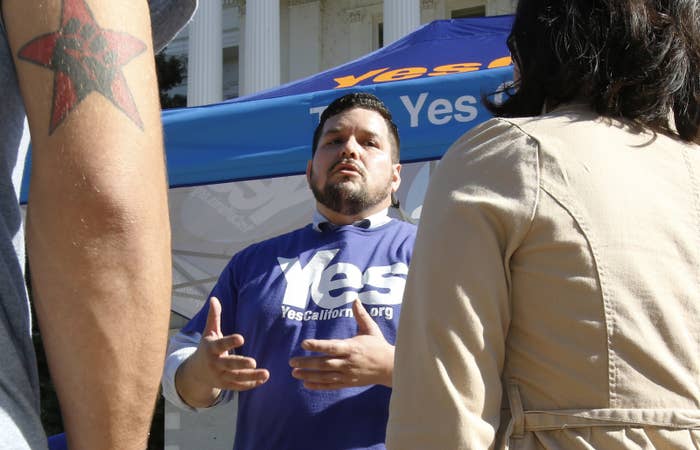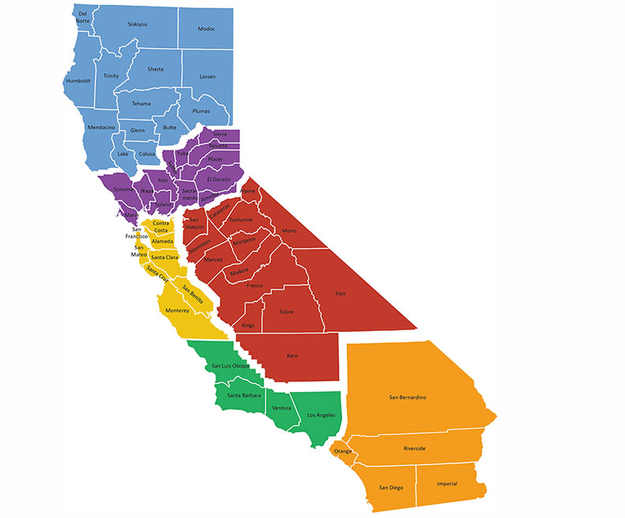Two weeks ago on Election Day, Californians voted to make Hillary Clinton president, legalize recreational marijuana, and bring back bilingual education in public schools. The results stood in stark contrast with the rest of the country as Donald Trump won the presidency.
Now, some Californians have had enough, and they're pushing hard to make the Golden State into its own country.
Members of the "Yes California" initiative filed a proposed ballot measure Monday that would let California residents vote on whether the state should try to break away from the rest of the country. The goal is to get the measure on the ballot in 2018 — something that will happen if organizers collect more than half a million signatures.
If the measure passes at the ballot box, it would eliminate part of the state constitution describing California as an “an inseparable part of the United States of America."
Passing the measure would then lead to a special election in 2019 where voters would decide if they want to leave the United States and become their own country.
Louis Marinelli — president of Yes California and leader of the so-called "Calexit" movement — told BuzzFeed News he began pushing for the state's independence in 2014 after Congress failed to take action on immigration policy. The secession movement has since gained momentum in the wake of Trump's Nov. 8 victory.
The group has a list of arguments in favor of secession, including that California's electoral votes don't matter, that the state pays more in taxes to the federal government than it receives in return, and that breaking away would give California access to vast lands and resources currently owned by the feds.

There's just one snag: The plan has little chance of succeeding.
Daniel Farber, a law professor at the University of California, Berkeley, described the odds of California breaking away from the United States as "one in a billion." Farber said the Golden State would face an array of challenges if it seceded, including deals over everything from trade to energy to copyrights on Hollywood films.
"It’d be like doing Brexit only harder," Farber said. "We’d have to negotiate over trade, passports, and travel. We’d have to negotiate over the Colorado River and whether we could get water out of that."
Secession faces serious procedural hurdles as well. The proposed ballot measure states that, if successful, the governor "shall carry and shepherd an application for the newly-independent Republic of California to join the United Nations."
But that plan would not actually make California an independent nation; Farber said that the UN "doesn’t have any power to do anything about this."
Instead, he explained, California would need the consent of other states to leave the US. How exactly that consent could be given is unclear — this particular issue hasn't come up before — though it could ultimately require a constitutional amendment. And either way, it would require the very lawmakers Californians want to break away from to get on board with the plan.
"At the very least it would take something passed by both houses of Congress and signed by Trump," Farber said. "We’re just sort of in unknown legal territory at that point."
Marinelli, however, pushed back against the idea that legal obstacles would keep California in the US, saying, "just because something is illegal at the moment doesn’t mean it has to always be that way."
"We take a position that Congress can’t tie it’s shoes let alone grapple with something as important as this," Marinelli added. "We don’t think they’ll even take the issue up. And if they don’t we’re going to go around them."
For the time being, the goal is to get the issue before voters and let them weigh in on it, he said.
Gov. Jerry Brown, whose term will end before the proposed 2019 special election, declined Tuesday to comment on secession. However, he did send BuzzFeed News a statement on the Nov. 8 election that calls for finding "common ground whenever possible."
"With the deep divisions in our country, it is incumbent on all of us — especially the new leadership in Washington — to take steps that heal those divisions, not deepen them," Brown's added.

The push to make California independent follows a number of other, failed bids to break up or alter borders in the region. One perennial proposal calls for a state called Jefferson to be carved out of northern California. Earlier this year it had support from numerous rural counties.
And in 2014, Silicon Valley billionaire Timothy Draper also pushed a proposal to break California into six separate states.
The proposal to secede entirely from the US takes the sentiment from those proposals even further. Farber speculated that the drive to leave the US was being propelled by Trump's election, cultural divisions between urban and rural areas, and the lack of a Cold War-style enemy that would make Americans want to remain in the union.
Still, Farber said, California is almost certainly not going to become its own country any time soon.
"I hate to be too bleak about these things," he said, "but I’d say its impossible."
